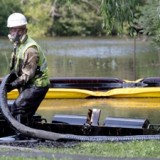The various spokespeople for supposed “grassroots” pro-Tar Sands and pipeline organization EthicalOil.org have steadfastly maintained their campaign has no connection to the oil and gas industry or the Harper Government. But as the links between these groups continue to pile up, that contention becomes harder and harder to swallow.
I witnessed conservative pundit Ezra Levant debut his “Ethical Oil” concept when he came to Vancouver to debate the Wilderness Committee’s Ben West in late 2010. The premise Levant laid out at the Rio Theatre – essentially, that bitumen from Canada is the “fair trade coffee” of the world’s oil supply because this country has a better human rights record than Saudi Arabia or Iran – was being parroted soon thereafter by newly minted Environment Minister Peter Kent.
The synchronicity of talking points between Ethical Oil, Enbridge, the Canadian Association of Petroleum Producers (the oil and gas industry’s official lobby) and the Harper Government should be our first clue that these entities are working together on some level.
“Ethical Oil” didn’t just spring from nowhere – it was carefully conceived in the manner of major advertising campaigns and the work of Republican strategist Frank Luntz (who coined “the death tax” in order to push lower estate taxes, and encouraged the Bush Administration to re-frame global warming as “climate change”, for instance). In fact, what we are presently witnessing around the Enbridge debate is the full-force implementation of American-style political campaign tactics – where everything is built around a single, simple concept – like “socialist” Obama-care (right!), “tough on terror”, or Orwellian distortions like the “Patriot “Act – which, no matter how illogical, gain traction through relentless, monosyllabic repetition, delivered via the triple threat of corporate media, government and corporate-backed lobbies, “think tanks” and pr firms.
It remains to be seen how effective these tactics will be with Canadians. Already there has been some surprising push-back in the mainstream media – from Stephen Hume’s shrewd analysis in the Vancouver Sun this week, to tough questions from CTV News and the CBC’s Evan Solomon (a must-watch) and Anna-Maria Tremonti (a must-listen) in recent weeks. At least some of the nation and province’s top political commentators aren’t falling for the Ethical Oil routine.
The parallel messaging extends to the notion of “foreign meddling” in the National Energy Board review of Enbridge’s proposal, now underway. The contention – from both Ethical Oilers and Stephen Harper, Industry Minister Joe Oliver and Finance Minister Jim Flaherty – is that because some large US philanthropies are donating money to campaigns in BC opposing Enbridge’s proposal, the decision making process is being “hijacked” by “radical environmentalists” fronting for American interests. I won’t go into this argument any further – for Stephen Hume and Terry Glavin of the Ottawa Citizen have both nailed the subject in their columns this week. The main point I wish to make is the extraordinary parity of messages coming from two entities that allegedly have no connection.
We don’t know where Ethical Oil’s funding derives from – it’s certainly not from $10 grassroots donations! – but here’s what we do know about the connections of this organization and its spokespeople to the federal Conservative government:
1. Ezra Levant is the former publisher of the conservative magazine the Western Standard, author of the book Ethical Oil and host of a political talk show on the Sun News Network. He is also the man who stepped aside for Stephen Harper in a 2002 byelection in Calagry Southwest so that the new Alliance Party leader could win a seat in parliament. Levant was apparently reluctant to do so at first, but eventually ceded to public pressure – thus doing a big favour for the future Prime Minister.
Prior to that bit of political gallantry, Levant had a long history of campaigning for key Reform/Alliance candidates. According to Wikipedia, “While he was a student-at-law, Levant was an active political organizer in the Reform Party, and guided the successful attempts by Rahim Jaffer (as the campaign manager for his nomination in Edmonton-Strathcona and later as his communications-director during the 1997 Federal Election) and Rob Anders to win party nominations. In 1997, he went to Ottawa to work for the Reform Party, becoming a parliamentary aide to party leader Preston Manning and being put in charge of Question Period strategy.”
Mr. Levant has also worked at both the right-wing Fraser Institute and the Charles G. Koch Institute – a think tank sponsored by the Texas oil billionaire family which is one of the leading financial backers of both the Republic Party machine and the oil lobby.
2. Levant resigned his duties as EthicalOil.org spokesperson soon after he launched the book and website, handing the role over to one Alykhan Velshi. A 29-year old lawyer, Velshi has been a top Conservative staffer for a number of years. He served as Immigration Minister Jason Kenney’s director of parliamentary affairs and communications until the 2011 federal election. Prior to that he worked for then-Minister of Foreign Affairs John Baird.
In 2011, Velshi briefly left the Harper Government to lead EthicalOil.org, only to return to Parliament Hill in late fall 2011 as the director of planning for the Prime Minister’s Office, no less.
Mr. Velshi’s mom also recently obtained a plum appointment by Industry Minister Joe Oliver (he who dismissed Enrbridge’s legions of opponents as a handful of environmental radicals in a recent open letter) to the Canadian Nuclear Safety Commission. The Opposition was quick to slam the hire as a patronage appointment. NDP MP Charlie Angus told Embassy Magazine, “There are a lot of credible engineers out there, but there’s not a lot of credible engineers whose sons are closely tied to the prime minister, Jason Kenney, and their ethical oil campaign for the tar sands. This is another case of who you know in the PMO.”
3. Mr. Velshi handed off the Ethical Oil baton to a 26-year old conservative law student at the University of Calgary named Kathryn Marshall this past fall. According to the Ottawa Citizen, it turns out Ms. Marshall is married to Hamish Marshall, Harper’s former strategic planning manager.
Watch Marshall get slaughtered by Evan Solomon on Inside Politics (note how Ms. Marshall refuses a dozen times to divulge whether her organization is bankrolled by Enbridge – if you still believe the Ethical Oil argument after watching this, I’m afraid you’re beyond help):
It is also worth noting as an aside that former Conservative minister David Emerson is today helping the Chinese buy into the Tar Sands. In 2009 Mr. Emerson became a member of the International Advisory Council for the Chinese Investment Management Corporation, which recently purchased an $801 million stake in Tar Sands properties near Peace River, Alberta. This on top of a long list of major recent Chinese investments in the Tar Sands. And of, of course, Chinese oil giant Sinopec recently revealed that it was one of 10 companies which ponied up $10 million each to sponsor Enbridge’s campaign to build the Northern Gateway Pipeline – some of the others we know about are major multi-national players based in Europe and the United States. Talk about foreign intervention in Canadian pipeline politics!
You can bet the Ethical Oil crew and Harper Government will carry on with the exact same talking points and revolving door connections, all the while maintaining the right hand has no idea what the left hand is doing.
It’s all just a big coincidence.
And if you believe that I’ve got some pond-front property in northeast Alberta you might like to buy.



